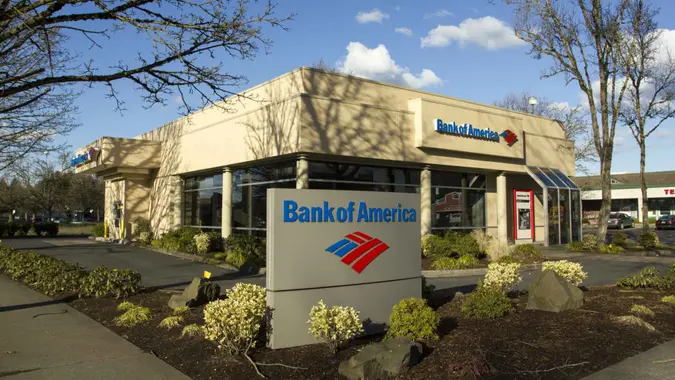What Is a Certificate of Deposit (CD)?

Commitment to Our Readers
GOBankingRates' editorial team is committed to bringing you unbiased reviews and information. We use data-driven methodologies to evaluate financial products and services - our reviews and ratings are not influenced by advertisers. You can read more about our editorial guidelines and our products and services review methodology.

20 Years
Helping You Live Richer

Reviewed
by Experts

Trusted by
Millions of Readers
A certificate of deposit is a type of savings account that earns interest for a set time frame, known as a term. The term is the length of time you agree to leave your money deposited in the CD.
If you leave your money untouched for the entire term, you won’t risk any penalties. Terms can vary in length, so make sure you’re comfortable without having those funds for the full duration. When the term ends, the CD has matured, and you can withdraw your money penalty-free.
Key Takeaways
- CDs typically offer higher interest rates than savings and money market accounts in exchange for leaving the funds untouched for the fixed term length.
- CDs are ideal if you have extra cash that you won’t need for an extended period and want to earn more interest than you would from a money market or savings account without having to risk the principal investment.
- Almost every bank or credit union offers a variety of CD options. But be sure to research which place is offering what, since some of the best CD rates can be over three times higher than the national average rates.
- Compared to more volatile investments such as stocks, CDs are considered safer and more conservative. There may be less reward, but there’s also less risk with a guaranteed rate of return.
How Does a Certificate of Deposit Work?
Once you’ve determined the bank or credit union you’d like to open your CD account, here’s what you should know about the actual process and how it earns money.
- Select the term length and the type of CD you need.
- Complete all of the deposit requirements, e.g., $1,000 minimum deposit or having another linked account at the bank.
- Provide your identifying information, including name, address, Social Security number or ITIN and your ID.
Say you’d like to open a 1-year CD with 4.00% APY and a $1,000 minimum deposit. You would earn $40 in interest on that initial $1,000.
When the CD term ends, you have a few options: You can choose to reinvest that money into another CD with the same term length, withdraw the money to use or use it to fund a different type of CD or savings option.
Types of Certificates of Deposit
Almost as many types of CDs exist as there are types of savers. Use this guide to help narrow your search and find the type of CD that will best suit your financial goals.
Here are some of the types of CDs that are available:
- Traditional CD: A traditional CD offers a fixed rate, so you’re guaranteed a certain amount of return at maturity
- No-penalty CD: No fee charged for early withdrawal, but usually pays a lower interest rate
- Jumbo CD: Requires a larger investment — usually $100,000 minimum — but pays higher interest rates
- Bump-up CD: Allows you to bump up to a higher interest rate if rates go up, but usually, only one rate increase is allowed
- Add-on CD: Allows you to make additional deposits during the CD’s term
Additionally, here are some available CD options, though they may be lesser-known:
- Callable CD: In return for a higher interest rate, allows the bank to redeem the CD before maturity, pay the principal and interest to you and close the account
- High-yield CD: Offers some of the highest interest rates available on the market
- Step-up CD: Allows you to lock in your interest rate for a period, and your rate will increase over the term
Each CD account’s terms and requirements will depend on the bank or financial institution.
Key Terms To Understand With CDs
You might see some terms floating around when you’re discussing CDs. Here’s a breakdown of some of these.
Annual Percentage Yield
The annual percentage yield is the interest rate you can expect to earn on your CD over a year. Compound interest also allows you to earn interest on the interest you’re currently earning as well.
Maturity Date
The maturity date is when your CD term ends. It’s at this point that you can decide what to do with your funds–either reinvest into another option, roll over into the same term or use the money.
Early Withdrawal Penalties
Many banks charge early withdrawal penalties or a fee if you choose to take out the money before the maturity date. The amount differs, but is often a percentage of the interest earned, depending on how many days the account has been open. If you’d rather have more flexibility, you can look at no-penalty CDs as an option.
CDs vs. Other Savings Options
Take a look at how CDs stack up against other savings options.
CDs vs. High-Yield Savings Accounts
Both CDs and savings accounts, particularly high-yield savings accounts, are considered a safe way to treat your savings, but each has nuances. Whereas a savings account will allow you to withdraw funds any time you need to, a CD will not let you touch the funds for the entirety of the term, under the risk of fees or loss of interest earned.
CDs vs. Treasury Bonds
CDs are issued by banks, credit unions and other similar financial institutions, whereas Treasury bonds are backed by the U.S. government. Both provide a guaranteed rate of interest during their term.
Treasury bonds have some tax advantages and you can often have a term that’s longer than many CDs.
CDs vs. Money Market Accounts
Money market accounts are a bit more liquid than CDs, which means you are free to take out the money as needed and continue to earn interest. CDs might be best if you’re looking to keep money in a separate fund and let it sit and earn.
Money market accounts, on the other hand, provide more flexibility. They function quite similarly to both a savings and a checking account, as you can earn interest and write checks, if the account offers them.
How To Choose the Best CD
First, you’ll need to determine which bank you want to use for your CD account. When considering banks, compare interest rates and maturity times to make sure you’re getting the most out of your CD. Almost all major financial institutions offer CDs. However, terms will vary by location. Additionally, CD rates change, so be sure to check current rates before you make your decision.
Most banks will have a minimum amount you can place into a CD, which can vary with the term of the CD and the interest rate. For instance, a bank might offer:
- A 12-month CD at 5.30% APY; minimum: $500
- A 24-month CD at 4.50% APY; minimum: $500
- A 36-month CD at 4.00% APY; minimum: $500
You’ll decide how much you want to deposit into the CD, open the CD account and then deposit the money. That money will stay locked in for the entire duration of the CD. Once the CD matures, you have the option of withdrawing the money you deposited — along with the promised interest.
If you bank with a credit union, your credit union’s CD products might be referred to as share certificates.
Many different types of CDs are available, as well as various strategies to maximize your earnings. Before you tie up your extra cash in a CD, learn about all the options to find out which CD might be right for you.
Are CDs Safe?
Like many other deposit accounts, CDs at banks are FDIC insured up to $250,000; you can’t lose money in a CD any more than you can in a savings account. Because they come with a guarantee, they are as safe as a checking account or savings account.
The risk inherent to a CD is that you may need to cash it out before it reaches maturity; if you do so, you could lose a significant amount of the interest you had gained.
Is a CD Right for You?
CDs can be considered a good investment for those looking for low risk and steady returns. Here are the major benefits of a certificate of deposit:
- Low risk: As long as you keep your money in a CD, you’re guaranteed to receive the stated interest from when you opened the account.
- Insurance: CDs carry insurance of up to $250,000, just like savings and checking accounts.
- Steady returns: Some CDs pay a very competitive rate, especially when compared with other interest-bearing deposit accounts, like savings accounts. You can use a CD rate calculator to compare your options.
As for how much money you should put in a CD, it depends. Limit your investment to an amount you don’t need to keep readily available.
When Not To Put Your Money in a CD
Although a CD is often the best option if you want higher interest and are willing to leave your money untouched for the term, a high-yield savings account may be better if flexibility is important.
For example, if you’re working on building an emergency fund, which you might need to access, a high-yield savings account is a better option than a CD because there’s a penalty if you have to access the money in your CD before it matures. If you don’t need to access the money for a while, bonds and stocks may be better yet.
FAQs About CDs
Here's more on CDs and what you should know.- What is a certificate of deposit, and how does it differ from a savings account?
- CDs often pay more in interest, although online savings accounts are becoming quite competitive with CD rates. In many instances, you can earn more by locking your money in a CD than you can by depositing your money in a savings account, which offers a bit more flexibility in terms of when you can add or withdraw funds. Savings accounts don't usually have the same withdrawal restrictions as CDs. You can access the money whenever you'd like, but many banks prohibit more than six transactions of a certain kind each month.
- Are CDs a good investment for retirement planning?
- CDs could be a good option for retirees or for those looking to plan for retirement, as they provide a fixed rate of return and are thus considered fairly low risk. However, its earning potential might not outpace inflation or be as lucrative as, say, a true retirement plan. Retirement plans such as a 401(k) or an IRA invest in stocks and other similar investments, and tend to have higher returns. CDs, however, can be a good way to add to or diversify your retirement savings plan.
- Can I add funds to my CD after opening it?
- No, you cannot usually add funds to your CD after opening. The rate and the amount you've deposited are locked in until the CD matures.
- What happens when a CD reaches its maturity date?
- A CD may charge penalties if you take out the money before its maturity date, ranging from a few months’ interest to all of the interest earned.
- How does inflation impact CD returns?
- CDs might be a solid choice in the short term. Long-term, however, they may not hold up well against inflation. Although CD rates are fixed — and that guaranteed rate of return is reassuring — it doesn't take into account inflation.
- Inflation could outpace what you might earn on your CD. In other words, if the cost of living and the prices of goods increase, the CD rate might not be in line with those future costs. So you might want to diversify your investment in ways that can offer a higher yield in the long term.
Explore More on CD Accounts
- How To Open a CD Account in 4 Simple Steps
- How Do CDs Work? Start Stacking Your Savings
- How Much Money Should You Keep in a CD Account?
- What Is a CD Ladder? What You Need To Know
- Pros and Cons of CD Accounts
GOBankingRates’ Best Banks 2025
- Best Banks
- Best High-Yield Savings Accounts
- Best Checking Accounts
- Best Online Banks
- Best Regional Banks
- Best Neobanks
Melanie Grafil, Cynthia Measom and Caitlyn Moorhead contributed to the reporting for this article.
Our in-house research team and on-site financial experts work together to create content that’s accurate, impartial, and up to date. We fact-check every single statistic, quote and fact using trusted primary resources to make sure the information we provide is correct. You can learn more about GOBankingRates’ processes and standards in our editorial policy.
- Bank of America. "What is a CD and how do they work?"
- Bank of America. "Savings accounts and CDs (certificates of deposit): Which should I choose?"
- Chase. "Are there different types of CDs?"
- City National Bank. "Certificate of Deposit (CD) Strategies to Consider."
- Charles Schwab. 2024. "CD or Treasury? Five Factors to Consider."
 Written by
Written by  Edited by
Edited by 

























